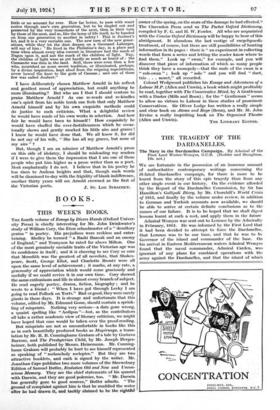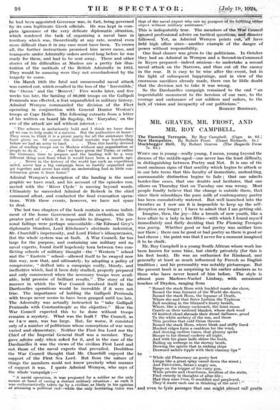THE TRAGEDY OF THE DARDANELLES.
WE are fortunate in the possession of an immense amount of authoritative contemporary writings concerning the ill-fated Dardanelles campaign, for there is more to be learnt from the story of this epic tragedy than from any other single event in our history. On the evidence afforded by the Report of the Dardanelles Commission, by Sir Ian Hamilton's Gallipoli Diary, by Mr. Churchill's. World .Crisis of 1915, and finally by the volume under review, in addition to German and Turkish accounts now available, we should be able to arrive at certain definite conclusions as to the causes of our failure. It is to be hoped that we shall digest lessons learnt at such a cost, and apply them in the future Admiral Wemyss was sent out to Lemnos by the Admiralty in February, 1915: He was informed by the First Lord that it had been decided to attempt to force the Dardanelles, that Lemnos was to be our base, and that he was to be Governor of the island and commander of the base. On his arrival in Eastern Mediterranean waters Admiral Wemyfis found that the naval commander, Admiral Carden, was ignorant of any plans for combined operations with the army against the Dardanelles, and that the island of which he had been appointed Governor was,, in fact, being:governed - by its own legitimate Greek officials. He was_ kept in com- plete ignorance of the .very., delicate diplomatic Isitgation, which rendered the task of. organizing a naval base in
territory which was, theoretically at any rate, neutral even more difficult than it in any case must have been. To crown all, the further instructions promised him never came, and transports ..under Admiralty orders arrived- long before he was ready for them; and had to be sent away. These and other stories of his difficulties at Mudros are a pretty fair illus- .tration of the methods of the British Admiralty in 1915.
,They would be amusing were they not overshadowed by the tragedy to come.
: On March 18th the fatal and unsuccessful naval attack was carried out, which resulted in the loss of the Irresistible,' the Ocean ' and the. !Bouvet.' Five weeks later; and five
weeks too late, the-talk:Mg of 80,000 troops on the Gallipoli Peninsula was effected, a feat unparalleled in military history. Admiral Wemyss commanded the division of the Fleet
operating in conjunction with General Hunter Weston's troops at Cape Helles. The following extracts from a letter
of his written on board his flagship, the Euryalus,' on the eve of the attacleire•not without interest :- " The scheme is audaciously bold and I think we have done all we can to help make it a success. But the authorities at home ! They seem -to think it is a picnic party for all the assistance they have given. us. Of course the initial mistake was bombarding before we had ati army to land. . . . Then this hastily devised plan of sending troops out to Mudros without any organisation or people to do it: . . . Alas ! we have given the Ttirks, or-rather the Germans, time to prepare and the landing will be a very different thing now from what it would have been a month ago. . . . Never in. the history of the world has such an expedition sailed, never has a big campaign been so hastily organized- and got together and never has such an undertaking:hat:1 so little con- , sideration given it from home."
Admiral Wemyss's description of the landing is the most graphic we have read, and his account of the episodes eon-
neeted with the River Clyde ' is moving beyond words, : Ultimately he succeeded Admiral de Robe ck in the chief
- command afloat, and conducted the final evacuation opera-. tions. With these events, however, we have not spice td deal. .
The last two chapters of the book contain a serious indict- ment of .the home Goverranent and its methods, with the greater part of which it is impossible to-disagree, The per- sonal failings were perhaps unavoidahleSir Edward Grey's diplomatic blunders, Lord Kitchener's obstinate indecision, Mr. Churchill's impetuosity, and-Lord Fisher's idiosyncrasies, But the whole"system was at fault. A War Council, far too large for the purpose; and containing one military and no naval experts, found itself hopelessly torn between two con- ' Meting schools of military thought—the " Western " school and the " Eastern " school—allowed itself to be swayed now this way, now that, and .ultimately, by adopting a policy of compromise, " drifted into a campaign costly, bloody, and
ineffective which; had if -been duly studied, properly prepared and only commenced when the necessary troops were avail- able, held-promise of brilliant results." . The story of the manner in which the War Council involved itself in the Dardanelles operations would be incredible if it were not tine. The. importance of holding the Gallipoli Peninsula with troops never seems to have been grasped until too late. The Admiralty was actually instructed to " take Gallipoli Peninstila with Constantinople as the objective." -How the War Council expected this to be done without troops remains a mystery. What was the fault ? -The Council, as
we 1 aye seen, was too large. But, far worse, it consisted only of a number of politicians whose conceptions of war were varied andrelementary. Neither the First Sea Lord nor the Chief of the Imperial General Staff was a member. They
gave advice only when asked for it, and in the' case of the Dardanelles it was the views of the civilian First Lord and not, those of the -naval experts that prevailed. Doubtless the War. Council thought that Mr. Churchill enjoyed the support of- the First Sea Lord. But from the nature of things the members could not know precisely what manner of support it was. I quote Admiral Wemyss, who says of the whole-campaign " A naval oPeration, it -was proOosed -by a- soldier as the only means at hand of easing a distant military situation : as such it was enthusiastically taken im by a civilian as likely in his opinion of attaiaiag-a-pohtical end-- • -the only hesitating .voice was..
that of the naval expert who saw no prospect of its fulfilling either object without military assistance:" -
This is indisputably true. The members of the. War Council ignored professional advice on tactical questions, and disaster followed. Yet, as Minkel Wemyss points out, 'all have held high office since—another example Of the danger of power without responsibility.
One final chance was given .to the politicians. In October they had an Admiral in -Wemyss and a Second-in-Command in Keyes prepared—indeed anxious—to undertake a second naval attack on the Narrows, and thus cut off the enemy in the rear. It is easy to be wise after the-event, but in the light of subsequent happenings, and in ' view of the enormous sacrifices already made, there can be little doubt that the decision not to take it was wrong.
So the Dardanelles campaign remained to the end " an imperishable monument to the heroism of our race, to the courage and endurance of our soldiers and" sailors, to the lack of vision and 'incapacity of our politicians."
ROBERT BOOTHBY.







































 Previous page
Previous page